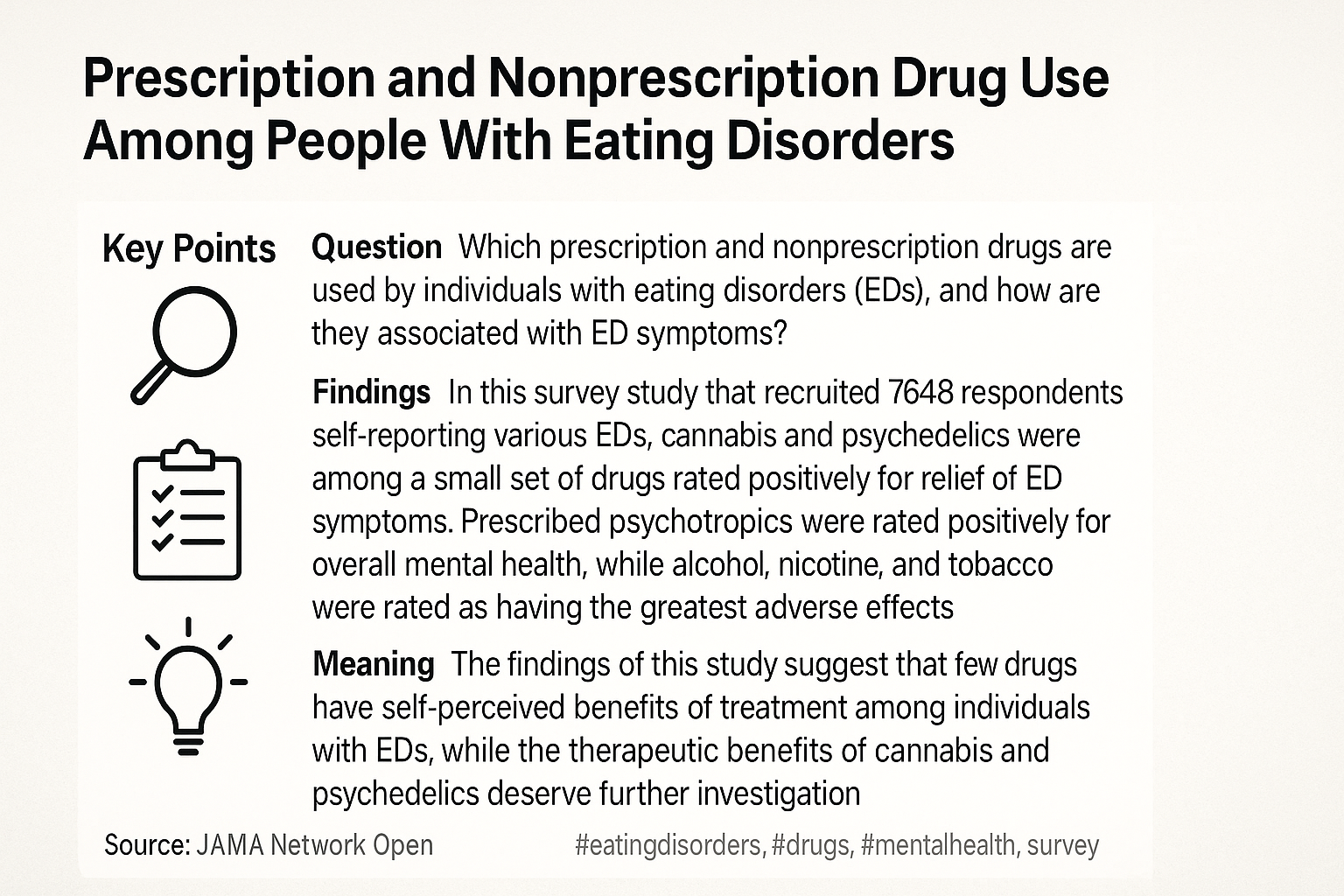
🔍 คำถามที่งานวิจัยตั้งไว้
งานวิจัยจาก JAMA Network Open ฉบับล่าสุด (เผยแพร่วันที่ 22 กรกฎาคม 2025) ตั้งคำถามสำคัญว่า:
“ยาที่ได้รับและไม่ได้รับการสั่งโดยแพทย์ชนิดใดที่ถูกใช้ในกลุ่มผู้ที่มีภาวะการกินผิดปกติ (Eating Disorders: EDs) และสิ่งเหล่านี้มีความเกี่ยวข้องอย่างไรกับอาการของโรค?”
การศึกษาครั้งนี้มุ่งหวังจะเข้าใจพฤติกรรมการใช้ยาในกลุ่มผู้ป่วย EDs และเปิดเผยมุมมองของผู้ป่วยต่อประโยชน์และโทษของสารแต่ละชนิด
📊 รายละเอียดของผู้ตอบแบบสอบถาม
- จำนวนผู้ตอบแบบสอบถาม: 7,648 คน
- เพศหญิง: 94%
- อายุเฉลี่ย: 24.3 ปี
- พื้นที่อาศัย: ออสเตรเลีย (30%), สหราชอาณาจักร (21.3%), สหรัฐอเมริกา (18%)
- ประเภทของ ED ที่รายงาน:
- อโนเร็กเซีย (Anorexia Nervosa): 40.8%
- บูลิเมีย (Bulimia Nervosa): 19.0%
- การกินมากเกิน (Binge-Eating Disorder): 11.4%
- การหลีกเลี่ยงอาหาร (Avoidant/Restrictive Food Intake Disorder): 8.9%
- ไม่ได้รับการวินิจฉัยอย่างเป็นทางการ: 37.7%
- โรคร่วมทางจิตเวชที่พบมากที่สุด: ภาวะซึมเศร้า (65.5%)
💊 ยาและสารที่ถูกรายงานว่ามีผลต่ออาการของโรค EDs
✅ ยาที่รายงานว่ามีประโยชน์ต่ออาการของ EDs
- กัญชา (Cannabis)
ผู้ป่วยจำนวนมากระบุว่ากัญชาช่วยบรรเทาอาการของโรค EDs เช่น ลดความวิตกกังวลเกี่ยวกับอาหารหรือภาพลักษณ์ตนเอง - ไซเคดีลิกส์ (Psychedelics)
เช่น แอลเอสดี (LSD) หรือเห็ดเมจิก รายงานว่ามีประสิทธิภาพในการเพิ่มความเข้าใจตนเอง และลดพฤติกรรมเสี่ยงในบางราย
💡 ยาที่ใช้ตามใบสั่งแพทย์ซึ่งมีผลดีต่อสุขภาพจิตโดยรวม
- ยาต้านเศร้า (Antidepressants)
โดยเฉพาะ ฟลูออกซีทีน (Fluoxetine) สำหรับบูลิเมีย และ ลิสเดกซแอมเฟตามีน (Lisdexamfetamine) สำหรับการกินมากเกิน
❌ สารที่ถูกมองว่ามีผลเสียมากที่สุด
- แอลกอฮอล์
- นิโคตินและบุหรี่
- คาเฟอีน
ผู้ป่วยระบุว่าสารเหล่านี้มีแนวโน้มทำให้อาการ EDs แย่ลงหรือกระตุ้นพฤติกรรมหลีกเลี่ยงอาหาร
🧠 ข้อค้นพบสำคัญจากงานวิจัย
- สารเพียงไม่กี่ชนิดเท่านั้น ที่ผู้ป่วยรู้สึกว่าช่วยบรรเทาอาการ EDs ได้
- ยาตามใบสั่งแพทย์ ส่วนมากช่วยเรื่องสุขภาพจิตโดยรวม แต่ไม่ตรงเป้ากับอาการของ EDs โดยเฉพาะ
- การใช้กัญชาและไซเคดีลิกส์ นั้นยังต้องการการศึกษาทางคลินิกเพิ่มเติม เนื่องจากผลลัพธ์ยังอยู่ในระดับ “การรับรู้ของผู้ใช้”
🧪 ความหมายเชิงนัยจากการศึกษา
แม้ว่ายารักษาโรคการกินผิดปกติจะยังมีไม่มากในระบบสุขภาพจิตปัจจุบัน แต่ ผู้ป่วยจำนวนหนึ่งแสดงให้เห็นถึงแนวโน้มในการใช้สารเพื่อบรรเทาอาการด้วยตนเอง ซึ่งอาจนำไปสู่การพัฒนาแนวทางการรักษาแบบใหม่หากมีการวิจัยอย่างเป็นระบบ
📌 สรุป
- งานวิจัยนี้เป็นหนึ่งในงานชิ้นแรกที่รวบรวม มุมมองของผู้ป่วย EDs กว่า 7,000 คนทั่วโลก
- ผลการศึกษาอาจนำไปสู่การปรับปรุงแนวทางการรักษาให้เหมาะกับความรู้สึกและประสบการณ์จริงของผู้ป่วย
- การศึกษานี้สนับสนุนให้มีการวิจัยเพิ่มเติมเกี่ยวกับ กัญชาและสารไซเคดีลิกส์ สำหรับใช้รักษา EDs
🔖 แหล่งอ้างอิง
Rodan SC, et al. Prescription and Nonprescription Drug Use Among People With Eating Disorders. JAMA Network Open. 2025; Published July 22, 2025. doi:10.1001/jamanetworkopen.2025.22406
เผยแพร่ภายใต้ใบอนุญาต CC-BY โดย JAMA Network Open.

